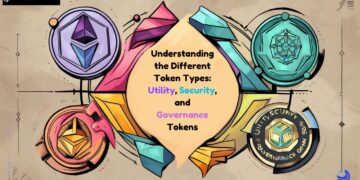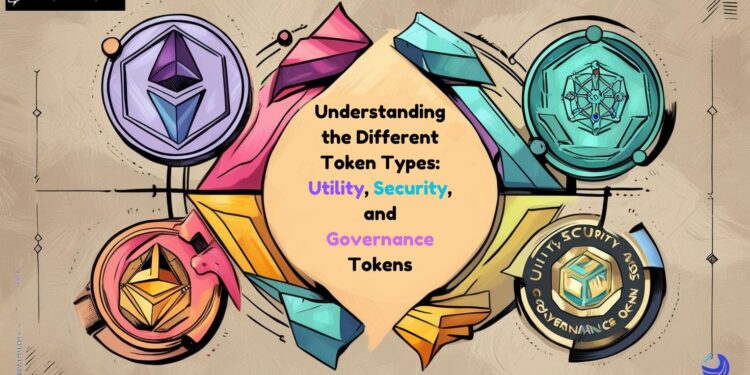What are the different types of tokens in the blockchain space, and how do they serve various purposes? Token development is one of the most important aspects of blockchain technology, and understanding the types of tokens—utility tokens, security tokens, and governance tokens—is crucial for businesses, developers, and investors in the crypto space. These tokens are not only the backbone of many blockchain projects but also help define how participants interact within a decentralized ecosystem.
According to a recent report by Cointelegraph, over 1,000 token projects were launched in 2023, underscoring the growing demand for specialized token types in different use cases. In this article, we’ll break down the three primary types of tokens: Utility Tokens, Security Tokens, and Governance Tokens, explaining their unique roles and how token development services can help businesses leverage each type effectively.
What Are Tokens?
Before diving into the specifics of each token type, let’s briefly define what a token is in the blockchain context. In simple terms, tokens are digital assets built on existing blockchain networks (like Ethereum, Binance Smart Chain, or Solana) that can represent various forms of value, including rights, ownership, and governance. These tokens are created and managed using smart contracts, which are self-executing contracts with the terms of the agreement directly written into code.
Tokens are categorized into various types based on their intended use, each serving a specific purpose in the broader blockchain ecosystem.
1. Utility Tokens: Powering Ecosystem Functions
What Are Utility Tokens?
Utility tokens are the most common type of tokens used within a blockchain ecosystem. These tokens serve as a means of accessing services or products within a specific blockchain platform. Rather than representing ownership or equity, utility tokens are designed to fuel transactions, pay for fees, or access functionalities within a decentralized application (DApp) or platform.
How Utility Tokens Work
- Payment for Services: Users can exchange utility tokens for services, like accessing a specific application or participating in a game.
- Transaction Fees: Utility tokens can be used to pay for transaction fees or gas fees associated with blockchain operations.
- Incentives: These tokens are often used to reward network participants, like miners or validators, who maintain the blockchain.
Examples of Utility Tokens
- Ether (ETH): Ethereum’s native token, used to pay transaction fees and power decentralized applications on the Ethereum blockchain.
- BNB (Binance Coin): Used within the Binance ecosystem for trading fees, decentralized finance (DeFi) applications, and more.
Token Development Services often help developers create utility tokens tailored for specific applications, ensuring they are seamlessly integrated into the blockchain ecosystem.
2. Security Tokens: Representing Asset Ownership
What Are Security Tokens?
Security tokens are digital representations of traditional assets, such as stocks, bonds, or real estate. They are designed to be compliant with regulatory requirements, making them an attractive choice for traditional investors looking to access blockchain-based investment opportunities. Security tokens represent ownership in underlying assets and offer a share in profits or dividends.
How Security Tokens Work
- Ownership Representation: Security tokens are tied to real-world assets, offering fractional ownership.
- Compliance with Regulations: Security tokens must comply with government regulations, including Securities and Exchange Commission (SEC) guidelines in the U.S. or MiFID II in the EU.
- Dividends and Profit Sharing: Security token holders may receive profits, interest, or dividends based on the performance of the underlying asset.
Examples of Security Tokens
- tZERO (TZROP): A tokenized security offering ownership in a platform focused on securities trading.
- Polymath (POLY): A platform for the issuance and management of security tokens.
For businesses seeking to raise capital or democratize access to investments, crypto token development services specializing in security tokens can create legally compliant and robust solutions.
3. Governance Tokens: Empowering Decentralized Control
What Are Governance Tokens?
Governance tokens are designed to give their holders the power to influence or control the decision-making process of a decentralized organization or project. These tokens enable participants to vote on protocol upgrades, changes to governance structures, or the allocation of resources within the ecosystem.
How Governance Tokens Work
- Voting Power: Governance token holders can vote on critical issues, including changes to protocol rules or funding decisions.
- Community-Led Development: These tokens foster a decentralized, community-driven approach to decision-making.
- Incentivizing Participation: Users are rewarded with governance tokens for their participation in the ecosystem, which creates a more active and engaged community.
Examples of Governance Tokens
- Uniswap (UNI): The governance token of the Uniswap decentralized exchange, used for voting on proposals related to protocol upgrades.
- Maker (MKR): A governance token used in the MakerDAO ecosystem, allowing holders to vote on key decisions for the Maker protocol.
Token Development Solutions tailored to governance tokens ensure that these tokens are built with a strong foundation for transparent and fair voting mechanisms.
Why Token Development is Essential for Blockchain Projects
Each of these token types plays a critical role in the success of blockchain projects, and Blockchain Token Creation Services are essential in ensuring that tokens are designed, developed, and deployed effectively. Here’s why:
- Customizable Use Cases: Token development can be tailored to meet the unique needs of a project, whether it’s for utility, security, or governance.
- Regulatory Compliance: For security tokens, ensuring compliance with local and international regulations is crucial, and token development companies help ensure this.
- Optimized Tokenomics: Proper tokenomics—how tokens are distributed, utilized, and exchanged—are critical to the long-term success of the project, and experienced developers can create the most effective models.
Conclusion
As blockchain technology continues to transform industries, understanding the different types of tokens—utility tokens, security tokens, and governance tokens—is vital for anyone involved in the crypto space. Whether you’re a developer, investor, or entrepreneur, token development services help create tailored solutions that empower decentralized ecosystems. With crypto token development companies offering specialized token development solutions, blockchain projects can successfully deploy the right type of token for their use case, boosting adoption, growth, and community participation.
In the rapidly evolving blockchain landscape, having a deep understanding of these tokens and their applications can be the key to unlocking new business opportunities and driving innovation.




















































